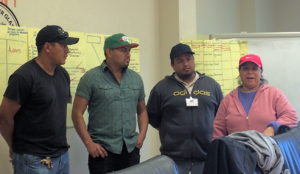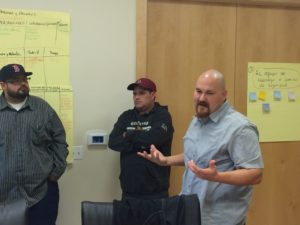In my three years with EFI, I’ve trained teams on farms in Mexico, California and Canada. Farmworkers have lots of good ideas about how to improve the way our produce is grown. At a recent training in Camarillo, CA, workers shone when they were given a chance to share those ideas with management.
The key component in EFI’s model of labor-management collaboration is the Leadership Team. Each team is composed of people who represent all the different jobs and demographics in that workplace: women, men, farmworkers, supervisors, technicians, managers, etc. During the EFI Leadership Team training, team members identify specific needs or problems related to the EFI Standards that they’ve experienced in the workplace. We then introduce a problem-solving process for formulating action plans, and encourage the Leadership Team to think through when and how they might present their proposal to their company’s upper management.
 At the Houweling’s Tomatoes facility in Camarillo, CA, we did things a little differently. We trainers had already met Ben Vazquez, the General Manager of US Operations, whose office was right down the hall from the training room. We thought: Why not have the team present their proposals directly to Ben the next day?
At the Houweling’s Tomatoes facility in Camarillo, CA, we did things a little differently. We trainers had already met Ben Vazquez, the General Manager of US Operations, whose office was right down the hall from the training room. We thought: Why not have the team present their proposals directly to Ben the next day?
After making sure that everyone was on board with the idea, that’s what happened. We gave the team some time in the morning to prepare their presentations. They had divided into two groups to investigate two different issues – one related to safety in the greenhouse and one related to ventilation in the packinghouse. The groups conferred, assigned roles, and arranged their visual aids for the presentation.
When Ben arrived, they were ready.
Each group walked Ben through the process they had followed to identify a problem, survey workers and gather information about the problem, brainstorm a long list of possible solutions, and finally, narrow these down to create a plan. They were poised and professional. They took turns explaining each step of the process. They simply knocked it out of the park!
 As I watched them and observed Ben’s reactions, I felt moved and proud. Though many of the team members may have met the general manager, this was their first time presenting a proposal directly to him. And yet there they were, rising to the occasion.
As I watched them and observed Ben’s reactions, I felt moved and proud. Though many of the team members may have met the general manager, this was their first time presenting a proposal directly to him. And yet there they were, rising to the occasion.
Ben listened attentively to each group. After the presentations, he thanked them for their work and gave them his perspective about some of the options the company was looking into related to the problems. They had an open and respectful conversation about working together to improve the company’s operations.
For me, this experience illustrates just one of the ways in which the EFI model, in partnership with committed organizations such as Houweling’s, can help to cultivate confidence, communication, and a formal mechanism in the workplace so that the voices and ideas of farmworkers can be heard.
Lilian Autler
Senior Facilitator, Workforce Development, EFI

